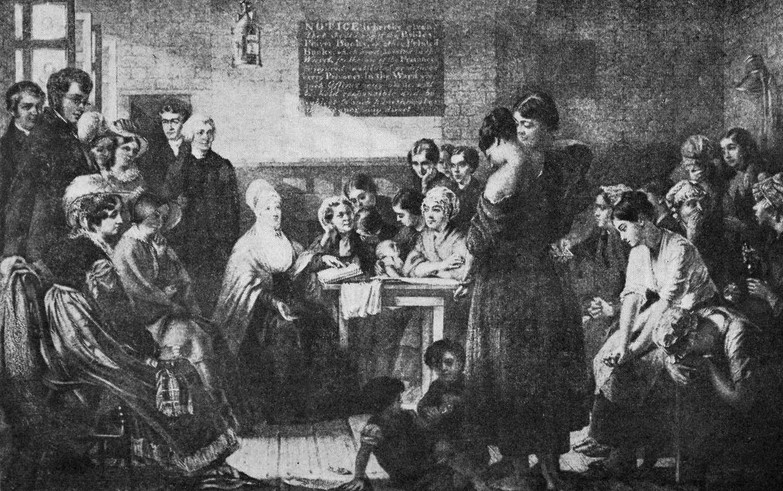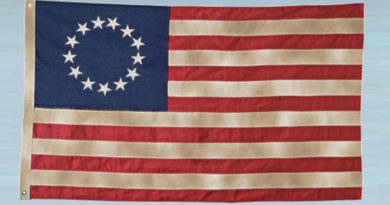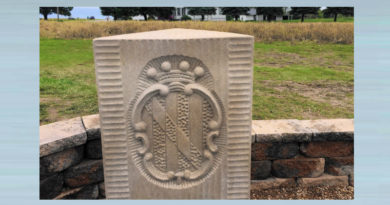5. Elizabeth Fry £5 Note
Posted on 20 October 2019
The £5 note featuring Elizabeth Fry (1780 – 1845) was issued in 2001 to celebrate the famous prison reformer.
Elizabeth was born into the wealthy Gurney family of Quakers living in Norwich. Her father John Gurney was a banker and factory owner, whilst her mother Catherine Bell was also a Quaker who came from the Barclays family of Bankers. Catherine believed that as Quakers the family had a responsibility to help the less fortunate and she would take Elizabeth on journeys to visit the poor bringing them food and clothes.
Human Rights
When she was 18, Elizabeth listened to a talk at Norwich Meeting House by William Savery, an American Quaker from Philadelphia. Savery was an active preacher, slave abolitionist and a defender of the rights of Native Americans. Hearing his words inspired her into action and she began speaking out on social issues.
“It is an honor to appear on the side of the afflicted.”
Elizabeth Fry
In 1800, aged 20, she married Joseph Fry, who was from one of the chocolate making Quaker families. Together they moved to East Ham, nearer to London and began a family. In 1813, the French-born American Quaker missionary Stephen Grellet prompted Fry to visit Newgate Prison and witness the conditions for herself.
What Fry saw horrified her. Old Newgate Gaol, 600 years old, had burned down in 1780 and the newly rebuilt Newgate Prison was already overcrowded and dirty. Prisoners slept on the floor, with only straw for bedding. There was only one tap for water and the toilet was a bucket.
Naturally, many prisoners were ill and there were many outbreaks of disease. Violence was also so frequent in the prison that the governor was scared to go into his own jail. Meanwhile, outside the prison there were public hangings for those condemned to death.
Prison Reform
Immediately, Fry set about helping ease the conditions of the prisoners. She began with the 300 women and children in Newgate Prison at the time. Small children were shut up with murderers. Children were locked up just because their mothers were in prison. Fry began to visit the women of Newgate Prison on a regular basis. She supplied them with clothes and established a school and a chapel in the prison.
Punishment is not for revenge, but to lessen crime and reform the criminal.Elizabeth Fry
Later she introduced a system of supervision that was administered by matrons and monitors. The women now had compulsory sewing duties and Bible reading.
Some prisoners were sent in ships to Australia. This was known as Transportation. Fry persuaded the British government to make the living conditions on prison ships better, and to make sure that women prisoners found homes and jobs in Australia. She also provided the women being transported with sewing kits, food and clothing to make their journey easier.
In 1817, Fry and eleven other Quakers, formed the Association for the Improvement of the Female Prisoners in Newgate. Her brother-in-law, Thomas Fowell Buxton was a member and the following year he published An Inquiry into Prison Discipline, a book based on his investigations of Newgate Prison.
In 1818, Buxton was elected as a Member of Parliment for Weymouth and he was now in a position to promote Fry’s work in the House of Commons. In one speech, Buxton pointed out that there were 107,000 people in British prisons, “A number greater than that of all the other kingdoms of Europe put together.”
Fry was invited to give evidence to a House of Commons Committee on London Prisons. She told them how women slept thirty to a room in Newgate Prison, “Each with a space of about six feet by two”. She also pointed out the lack of separation between prisoners saying, “Old and young, hardened offenders with those who had committed only a minor offence or their first crime; the lowest of women with respectable married women and maid-servants”.
Although the MPs were impressed with Fry’s work, they strongly disapproved of some of her comments such as her view that, “Capital punishment was evil and produced evil results”. The vast majority of the members of the House of Commons fully supported the system where criminals could be executed for over 200 offences, such as stealing clothes or passing a forged banknote.
From the 1820s, under pressure from the campaigning, new laws were passed to improve prisons. Women warders were put in charge of women prisoners and warders were paid properly, instead of taking money from prisoners. By the 1820s, Fry had become a well-known personality in Britain. It was extremely unusual for a woman to be consulted by men for her professional knowledge. Fry was strongly criticised for playing this role and she was attacked in the press for ‘neglecting’ her home and family.
Other Charitable Work
In 1824, Fry took a holiday in Brighton where she was shocked by the large number of beggars in the street. She investigated the situation and discovered considerable poverty in the town. Fry decided to form the Brighton District Visiting Society.
The plan was to establish a team of voluntary visitors who would go into the homes of the poor where they would provide help and comfort. The scheme was a great success and soon there were District Visiting Societies in towns all over Britain.
After her husband went bankrupt in 1828, Fry’s good character was called into question, but Fry carried on and received funds from her banking side of the family. All debts were paid and Fry expanded her charity work. In 1840, she started a school for nurses at Guy’s Hospital, in London. Several years later, in 1854, Florence Nightingale took ‘Fry nurses’ with her to the Crimean War.
Queen Victoria took a close interest in her work and the two women met several times. Victoria gave her money to help with her charitable work. In her journal, Victoria wrote that she considered Fry a, “Very superior person”. It is claimed that Victoria, who was 40 years younger than Elizabeth Fry at the time, might have modelled herself on this woman who successfully combined the roles of mother and public figure.
After a short illness, Fry died in 1845. Although Quakers do not have a traditional funeral service, over a thousand people stood in silence as she was buried at the Society of Friend’s graveyard at Barking.
The image of Fry for the £5 note is taken from artist’s Jerry Barret’s 1860 painting entitled, Mrs Fry Reading to the Prisoners in Newgate in the year 1816.
The £5 note was in circulation for 15 years before being withdrawn in 2016.

Mrs Fry Reading to the Prisoners in Newgate in the year 1816.
Images from www.open.edu and https://www.regencyhistory.net





